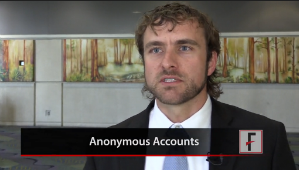User login
ORLANDO — If you’re on social media sites such as Twitter and Facebook, or considering joining one, there’s one type of post you should absolutely refrain from making.
In an interview at the American College of Physicians annual meeting, Dr. Matthew DeCamp, assistant professor at the Johns Hopkins Berman Institute of Bioethics and in the Johns Hopkins division of general internal medicine, revealed the type of post that poses greatest danger for clinicians, and outlined other tips for safely navigating social media as a physician.
On Twitter @naseemmiller
ORLANDO — If you’re on social media sites such as Twitter and Facebook, or considering joining one, there’s one type of post you should absolutely refrain from making.
In an interview at the American College of Physicians annual meeting, Dr. Matthew DeCamp, assistant professor at the Johns Hopkins Berman Institute of Bioethics and in the Johns Hopkins division of general internal medicine, revealed the type of post that poses greatest danger for clinicians, and outlined other tips for safely navigating social media as a physician.
On Twitter @naseemmiller
ORLANDO — If you’re on social media sites such as Twitter and Facebook, or considering joining one, there’s one type of post you should absolutely refrain from making.
In an interview at the American College of Physicians annual meeting, Dr. Matthew DeCamp, assistant professor at the Johns Hopkins Berman Institute of Bioethics and in the Johns Hopkins division of general internal medicine, revealed the type of post that poses greatest danger for clinicians, and outlined other tips for safely navigating social media as a physician.
On Twitter @naseemmiller
AT ACP INTERNAL MEDICINE 2014
